Immigration officials have three weeks to decide whether to approve the citizenship application of a South Korean-born U.S. Army specialist who is suing after the military discharged her, a judge ruled Tuesday.
Yea Ji Sea filed a lawsuit against the Department of Homeland Security last month after the military moved to discharge her.
The woman came to the country as a child on a visitor visa and held other visas before enlisting in 2013 under a special government program for foreign citizens who want to serve in the U.S. military.
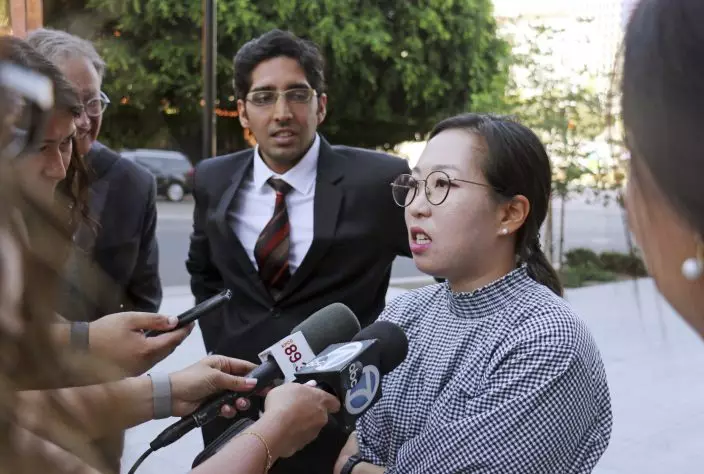
Yea Ji Sea, a former U.S. Army specialist who was born in South Korea, and her attorney Sameer Ahmed talk with reporters after a federal court hearing in Los Angeles Tuesday, Aug. 14, 2018. Sea filed a lawsuit in July, 2018, demanding a response to her citizenship application after the military moved to discharge her. She has since been discharged. U.S. District Judge Michael Fitzgerald says the government will have to rule on Sea's application by Sept. 5 or explain the delay to the court. (AP PhotoAriel Tu)
Under the program, recruits agreed in their enlistment contracts to apply to naturalize as soon as their honorable service was certified.
Sea, 29, alleges in her lawsuit that the government improperly failed to process her application.
She sat in the front row of a Los Angeles courtroom on Tuesday as U.S. District Judge Michael Fitzgerald said he expected the government to rule on Sea's citizenship by Sept. 5 or explain any reason for a delay.
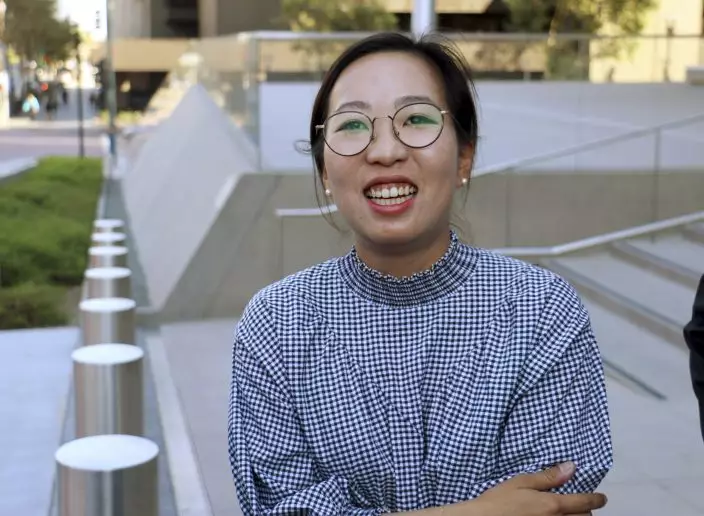
Yea Ji Sea, a former U.S. Army specialist who was born in South Korea, talks with reporters after a federal court hearing in Los Angeles Tuesday, Aug. 14, 2018. Sea filed a lawsuit in July, 2018, demanding a response to her citizenship application after the military moved to discharge her. She has since been discharged. U.S. District Judge Michael Fitzgerald says the government will have to rule on Sea's application by Sept. 5 or explain the delay to the court. (AP PhotoAriel Tu)
Sea is scheduled to have an interview with U.S. Citizenship and Immigration Services officials Wednesday, Assistant U.S. Attorney Tim Biche said. The government wants to resolve her citizenship application quickly, but first officials have to hear what she says in the interview, Biche said.
In the meantime, Sea is suffering "serious harm" because she cannot legally work in the U.S. and fears she could be arrested by immigration officers, said Sameer Ahmed, an attorney with the American Civil Liberties Union of Southern California, who is representing Sea.
"As a soldier, I would think that I would be protected by at least some kind of law that would say, 'I shouldn't have to worry about driving back home,'" Sea said outside the courthouse. "I was really thinking it would be OK."
Ahmed believes Sea's case is part of a greater effort by the Trump administration to deny citizenship to soldiers "based on the fact that they don't believe immigrants should get the right to citizenship that they're owed," he said.
The Associated Press reported last month immigration attorneys knew of more than 40 U.S. Army reservists and recruits who enlisted in the military with a promised path to citizenship and have been discharged or whose status has become questionable, jeopardizing their futures.
The Army has since temporarily stopped discharging immigrant recruits, pending a review of the program.
Sea, who has received two Army achievement medals, applied to naturalize in 2014 but was denied after immigration officials alleged there had been a fraudulent document in an earlier student visa application. Sea believed the paperwork she obtained through an approved language school was legitimate, according to the lawsuit, but the school's owner was convicted in a fraud case.
Sea said at first she didn't really grasp what the Army was, but fell in love with it after joining. She said she hopes to one day rejoin the Army to serve as a physician.
Associated Press writer Michael Balsamo contributed to this report.
UNITED NATIONS (AP) — The United States vetoed a widely backed U.N. resolution Thursday that would have paved the way for full United Nations membership for Palestine, a goal the Palestinians have long sought and Israel has worked to prevent.
The vote in the 15-member Security Council was 12 in favor, the United States opposed and two abstentions, from the United Kingdom and Switzerland. U.S. allies France, Japan and South Korea supported the resolution.
The strong support the Palestinians received reflects not only the growing number of countries recognizing their statehood but almost certainly the global support for Palestinians facing a humanitarian crisis caused by the war in Gaza, now in its seventh month.
The resolution would have recommended that the 193-member U.N. General Assembly, where there are no vetoes, approve Palestine becoming the 194th member of the United Nations. Some 140 countries have already recognized Palestine, so its admission would have been approved, likely by a much higher number of countries.
U.S. deputy ambassador Robert Wood told the Security Council that the veto “does not reflect opposition to Palestinian statehood but instead is an acknowledgment that it will only come from direct negotiations between the parties."
The United States has “been very clear consistently that premature actions in New York — even with the best intentions — will not achieve statehood for the Palestinian people,” deputy State Department spokesman Vedant Patel said.
His voice breaking at times, Palestinian U.N. Ambassador Riyad Mansour told the council after the vote: “The fact that this resolution did not pass will not break our will and it will not defeat our determination.”
“We will not stop in our effort,” he said. “The state of Palestine is inevitable. It is real. Perhaps they see it as far away, but we see it as near.”
This is the second Palestinian attempt for full membership and comes as the war in Gaza has put the more than 75-year-old Israeli-Palestinian conflict at center stage.
Palestinian President Mahmoud Abbas first delivered the Palestinian Authority’s application for U.N. membership in 2011. It failed because the Palestinians didn’t get the required minimum support of nine of the Security Council’s 15 members.
They went to the General Assembly and succeeded by more than a two-thirds majority in having their status raised from a U.N. observer to a non-member observer state in 2012. That opened the door for the Palestinian territories to join U.N. and other international organizations, including the International Criminal Court.
Algerian U.N. Ambassador Amar Bendjama, the Arab representative on the council who introduced the resolution, called Palestine’s admission “a critical step toward rectifying a longstanding injustice" and said that “peace will come from Palestine’s inclusion, not from its exclusion.”
In explaining the U.S. veto, Wood said there are “unresolved questions” on whether Palestine meets the criteria to be considered a state. He pointed to Hamas still exerting power and influence in the Gaza Strip, which is a key part of the state envisioned by the Palestinians.
Wood stressed that the U.S. commitment to a two-state solution, where Israel and Palestine live side-by-side in peace, is the only path for security for both sides and for Israel to establish relations with all its Arab neighbors, including Saudi Arabia.
“The United States is committed to intensifying its engagement with the Palestinians and the rest of the region, not only to address the current crisis in Gaza, but to advance a political settlement that will create a path to Palestinian statehood and membership in the United Nations,” he said.
Mansour, the Palestinian U.N. ambassador, reiterated the commitment to a two-state solution but asserted that Israel believes Palestine "is a permanent strategic threat."
"Israel will do its best to block the sovereignty of a Palestinian state and to make sure that the Palestinian people are exiled away from their homeland or remain under its occupation forever,” he said.
He demanded of the council and diplomats crowded in the chamber: “What will the international community do? What will you do?”
Israeli-Palestinian negotiations have been stalled for years, and Israel’s right-wing government is dominated by hard-liners who oppose Palestinian statehood.
Israeli U.N. Ambassador Gilad Erdan called the resolution “disconnected to the reality on the ground” and warned that it “will cause only destruction for years to come and harm any chance for future dialogue.”
Six months after the Oct. 7 attack by the Hamas militant group, which controlled Gaza, and the killing of 1,200 people in “the most brutal massacre of Jews since the Holocaust,” he accused the Security Council of seeking “to reward the perpetrators of these atrocities with statehood.”
Israel’s military offensive in response has killed over 32,000 Palestinians, according to Gaza’s health ministry, and destroyed much of the territory, which speaker after speaker denounced Thursday.
After the vote, Erdan thanked the United States and particularly President Joe Biden “for standing up for truth and morality in the face of hypocrisy and politics.”
He called the Palestinian Authority — which controls the West Bank and the U.S. wants to see take over Gaza where Hamas still has sway — “a terror supporting entity.”
The Israeli U.N. ambassador referred to the requirements for U.N. membership – accepting the obligations in the U.N. Charter and being a “peace-loving” state.
“How can you say seriously that the Palestinians are peace loving? How?” Erdan asked. “The Palestinians are paying terrorists, paying them to slaughter us. None of their leaders condemns terrorism, nor the Oct. 7 massacre. They call Hamas their brothers.”
Despite the Palestinian failure to meet the criteria for U.N. membership, Erdan said most council members supported it.
“It’s very sad because your vote will only embolden Palestinian rejectionism every more and make peace almost impossible,” he said.
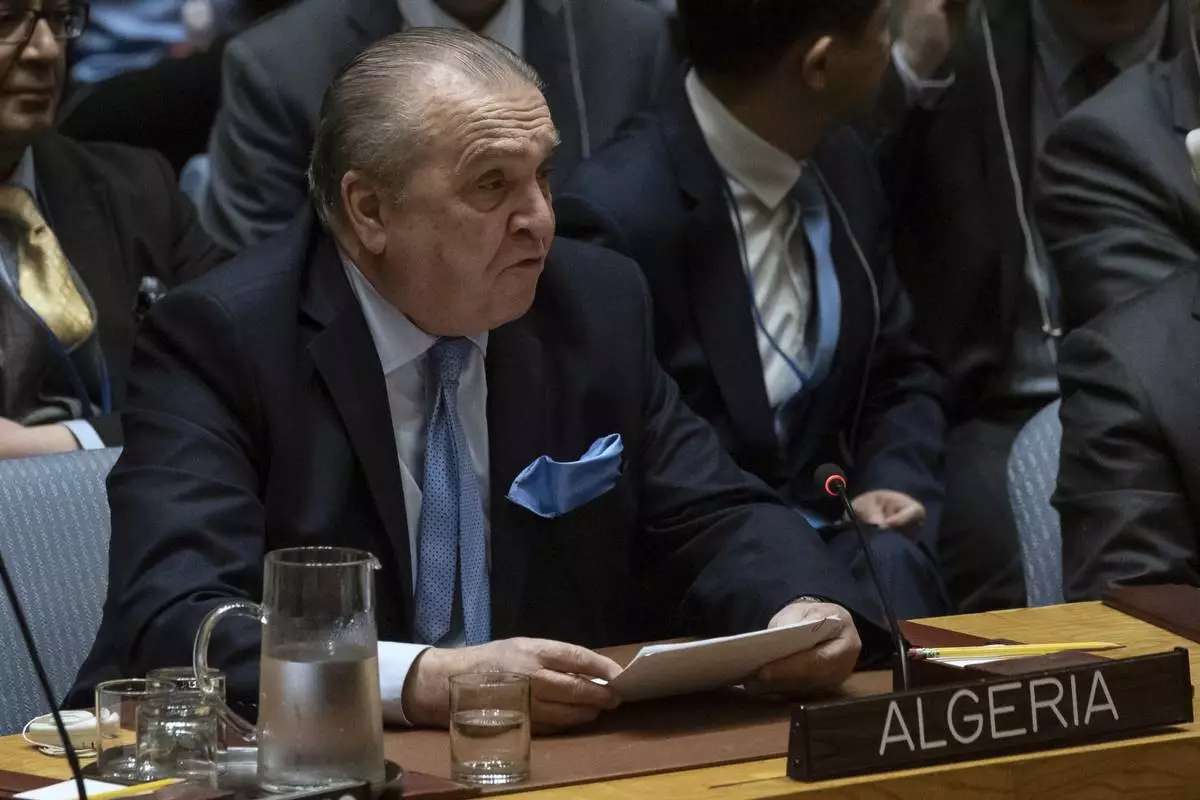
Algeria's Permanent Ambassador to the United Nations Amar Bendjama speaks during a Security Council meeting at United Nations headquarters, Thursday, April 18, 2024. (AP Photo/Yuki Iwamura)
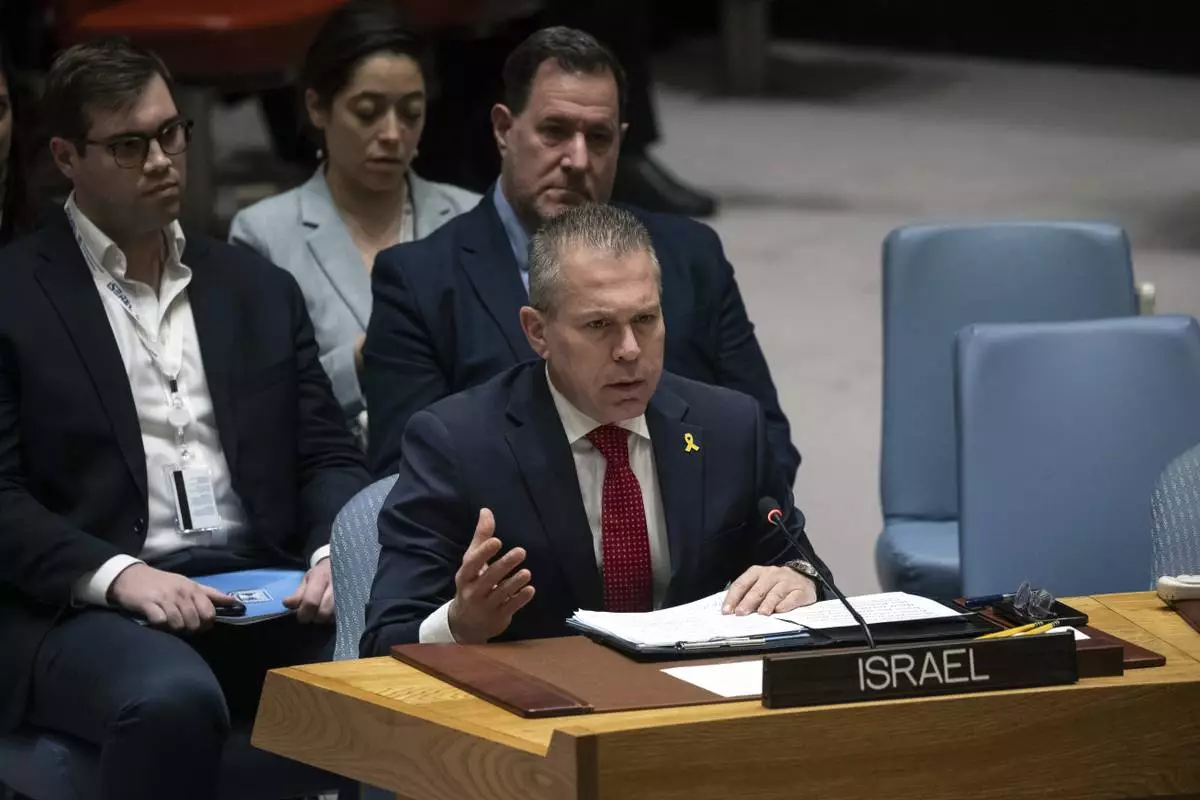
Israeli Ambassador to the United Nations Gilad Erdan speaks during a Security Council meeting at United Nations headquarters, Thursday, April 18, 2024. (AP Photo/Yuki Iwamura)
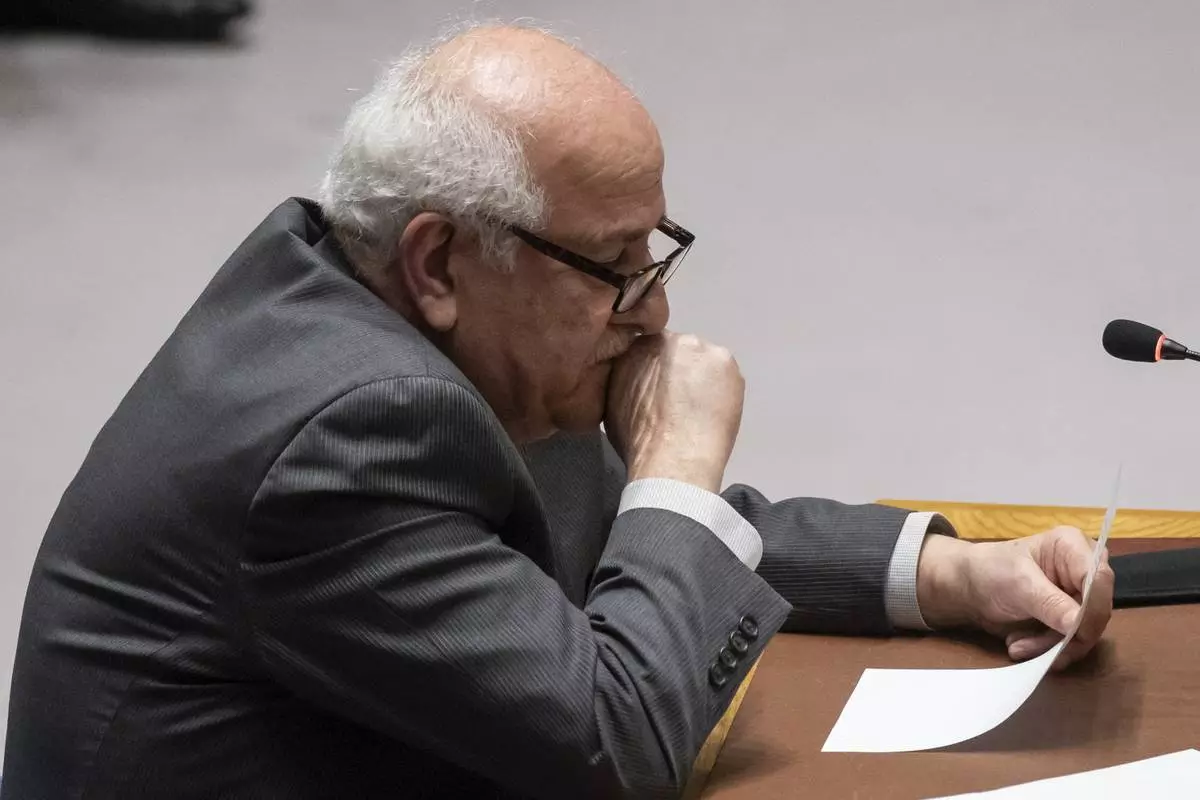
Palestinian Ambassador to the United Nations Riyad Mansour holds tears while speaking during a Security Council meeting at United Nations headquarters, Thursday, April 18, 2024. (AP Photo/Yuki Iwamura)
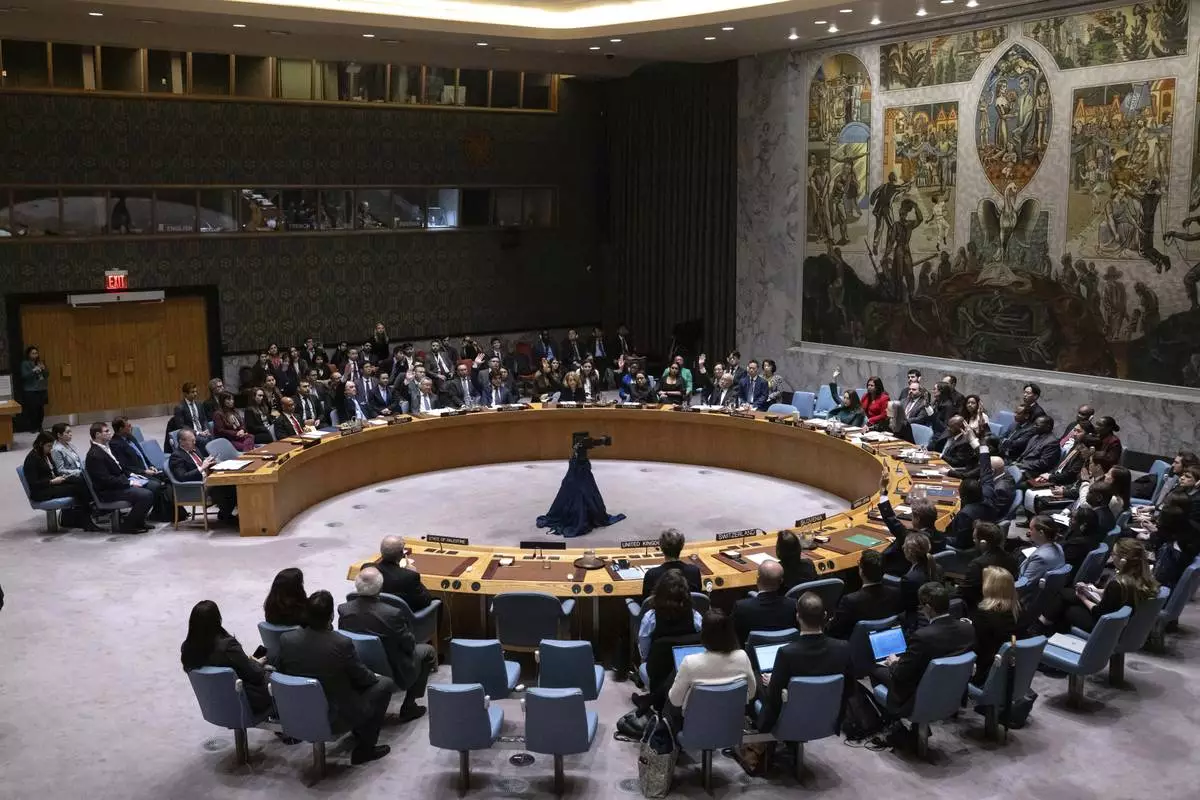
Representatives of member countries take votes during a Security Council meeting at United Nations headquarters, Thursday, April 18, 2024. (AP Photo/Yuki Iwamura)
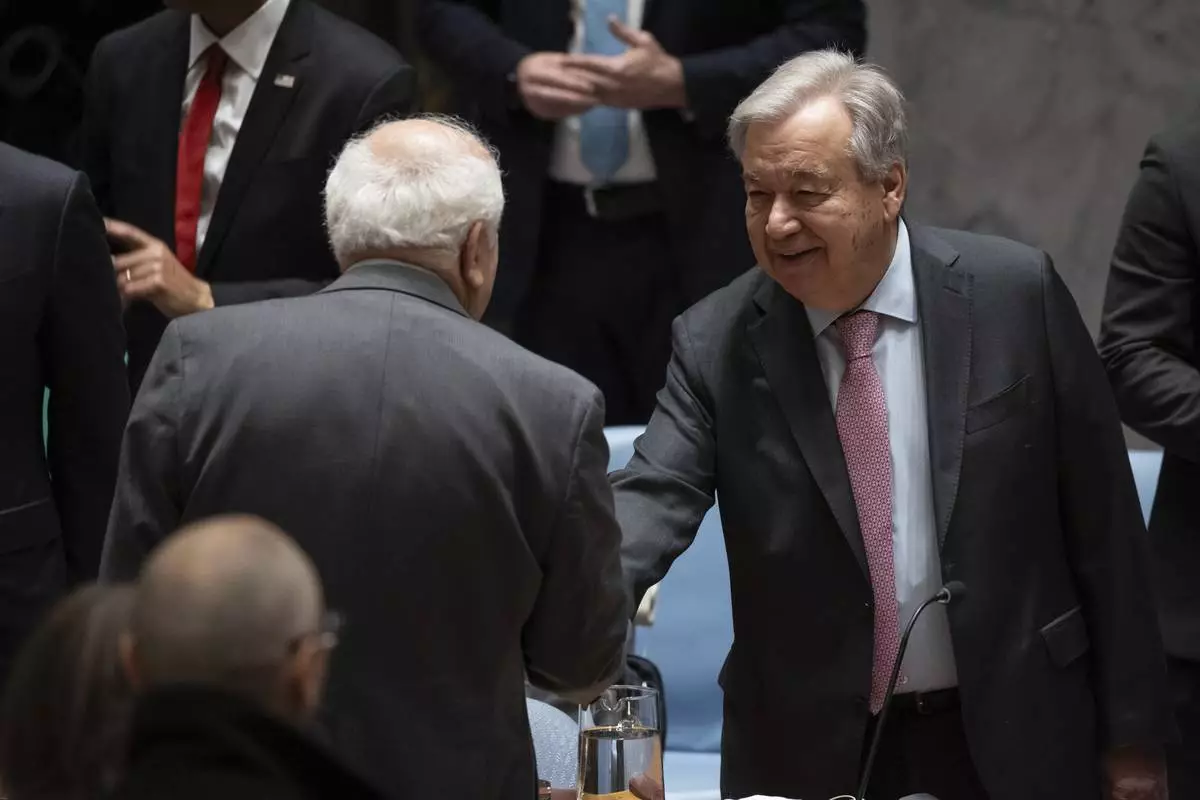
Palestinian Ambassador to the United Nations Riyad Mansour, left, and United Nations Secretary-General Antonio Guterres speak before a Security Council meeting at the United Nations headquarters, Thursday, April 18, 2024. (AP Photo/Yuki Iwamura)
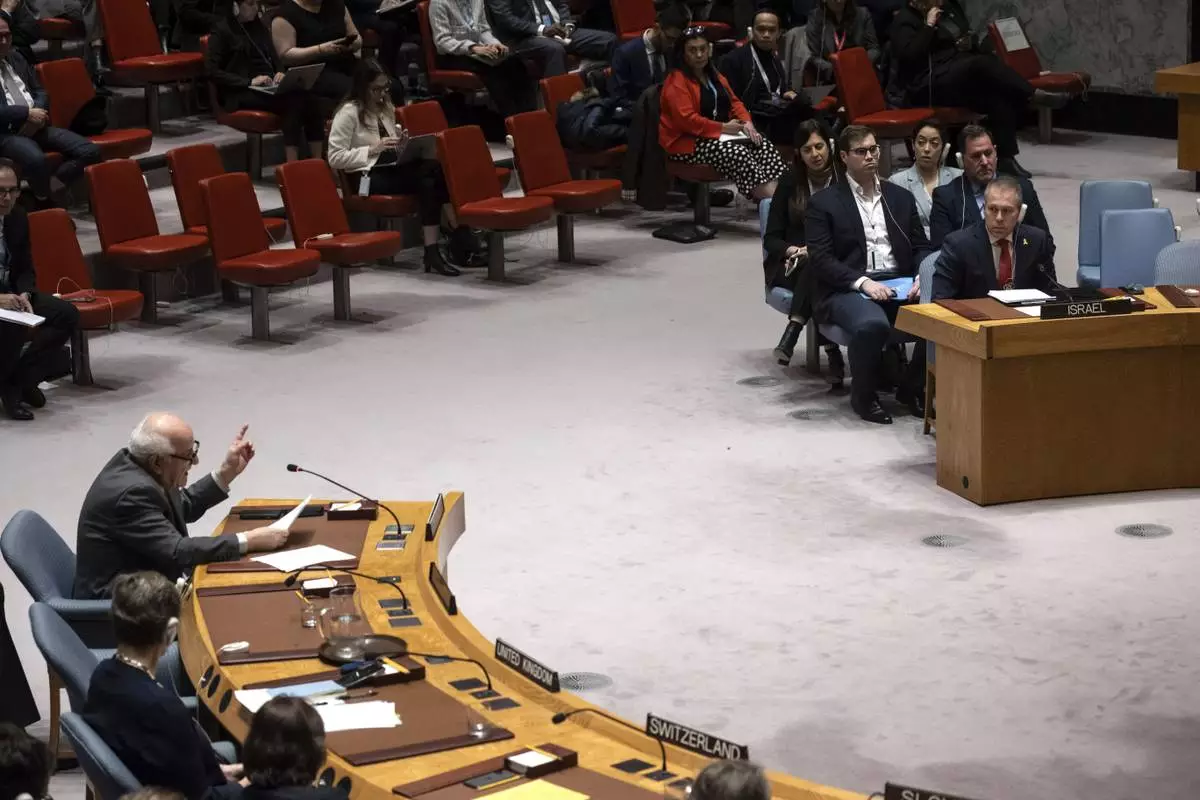
Palestinian Ambassador to the United Nations Riyad Mansour speaks during a Security Council meeting at United Nations headquarters, Thursday, April 18, 2024. (AP Photo/Yuki Iwamura)
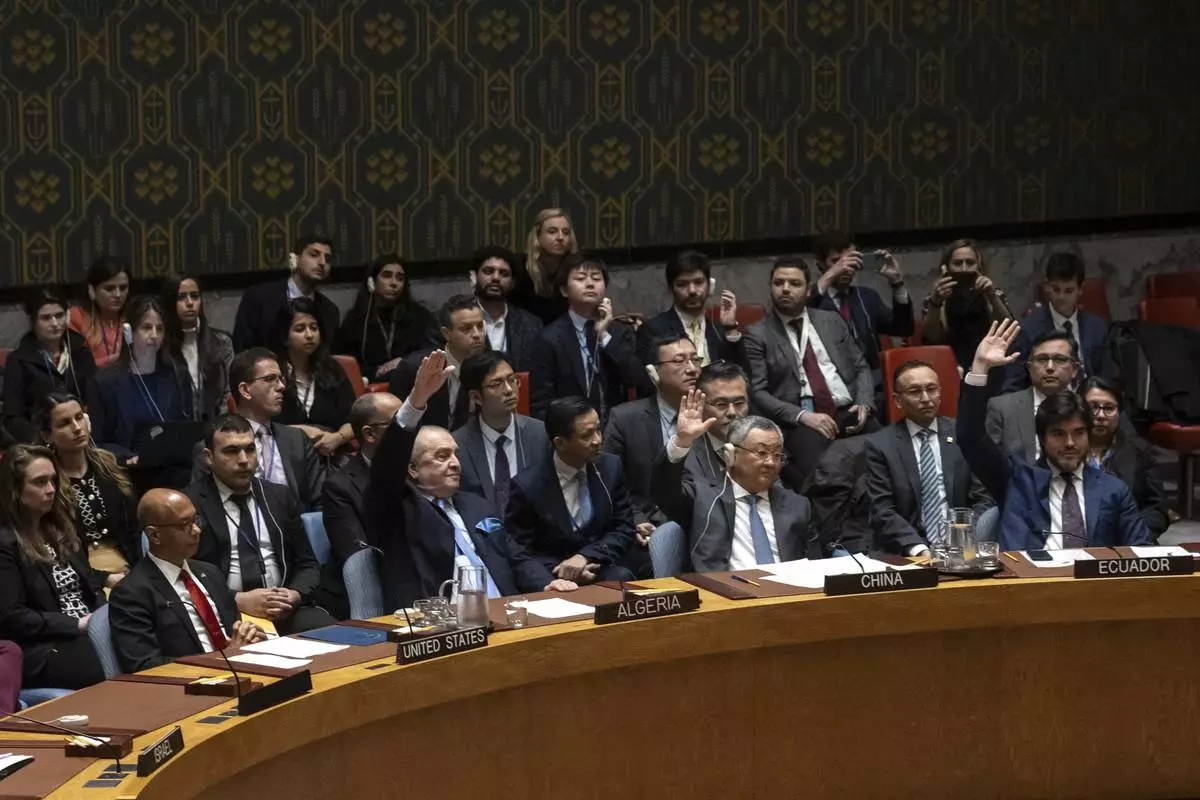
Representatives of member countries take votes during a Security Council meeting at United Nations headquarters, Thursday, April 18, 2024. (AP Photo/Yuki Iwamura)
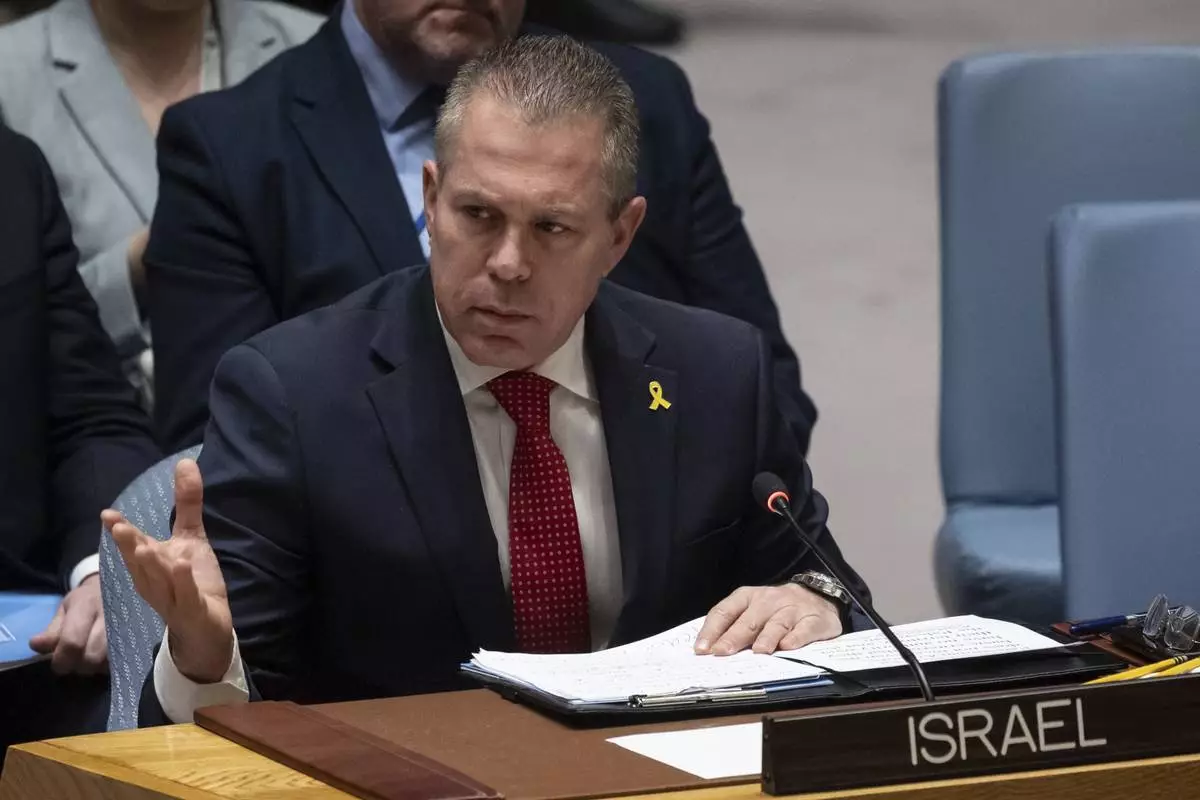
Israeli Ambassador to the United Nations Gilad Erdan speaks during a Security Council meeting at United Nations headquarters, Thursday, April 18, 2024. (AP Photo/Yuki Iwamura)
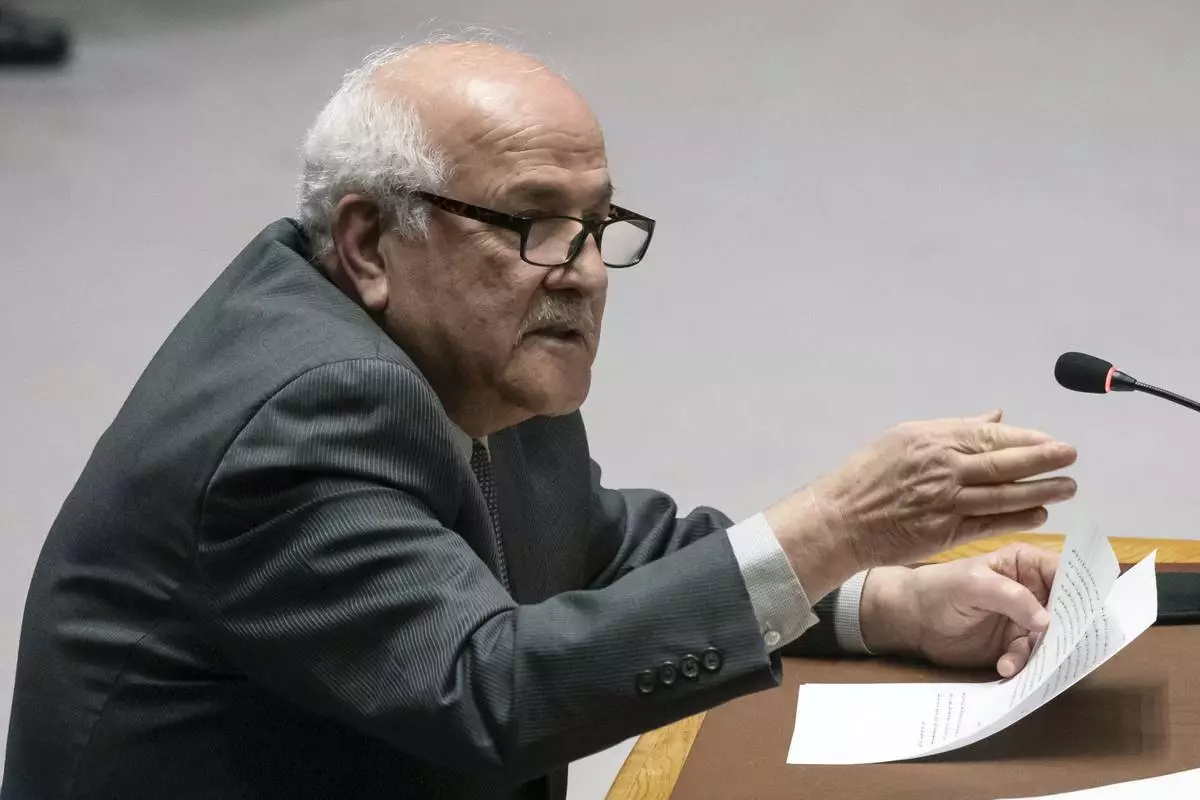
Palestinian Ambassador to the United Nations Riyad Mansour speaks during a Security Council meeting at United Nations headquarters, Thursday, April 18, 2024. (AP Photo/Yuki Iwamura)
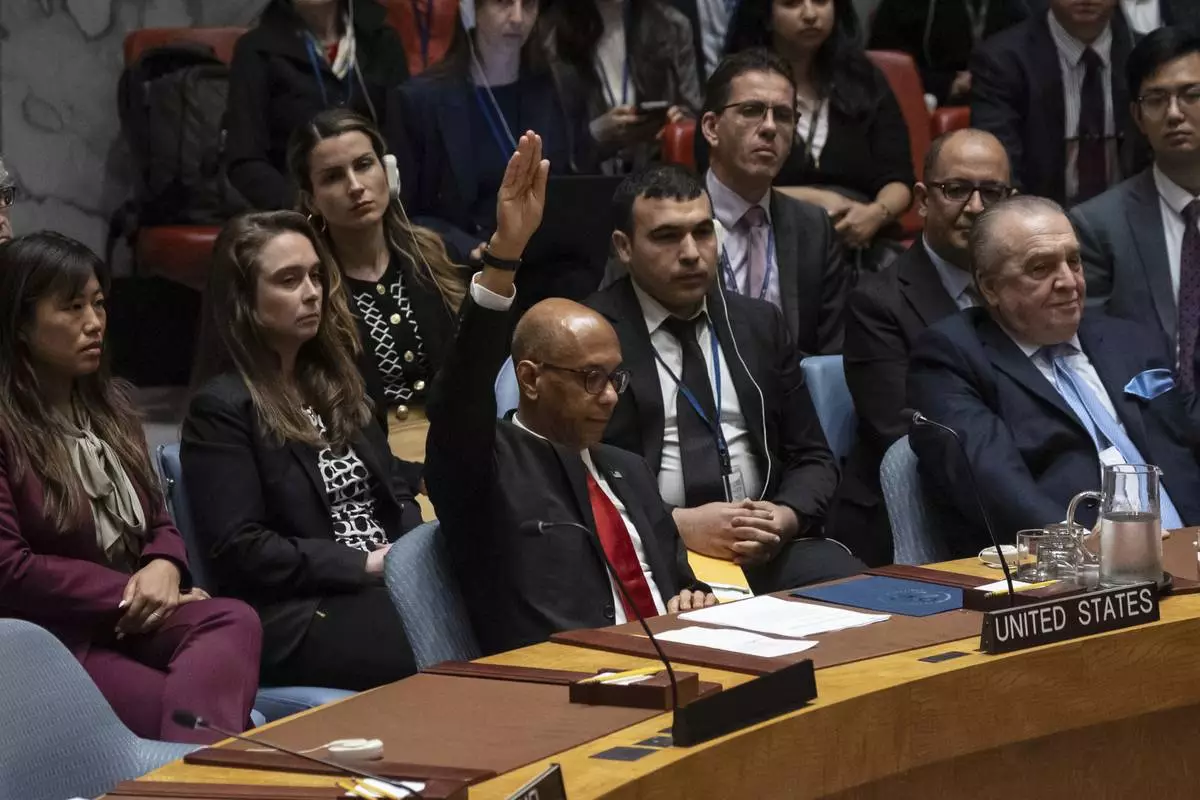
U.S. Deputy Ambassador Robert Wood votes against resolution during a Security Council meeting at United Nations headquarters, Thursday, April 18, 2024. (AP Photo/Yuki Iwamura)





















